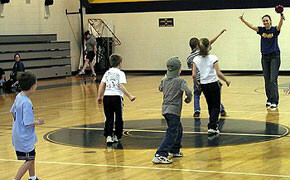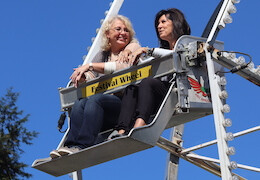Supporting National Physical Fitness and Sports Month
 SWU student Monica Wilkerson of Chesnee, far right, leads local youth in a Pot and Spoon Freeze relay, a version of Red Light/Green Light that can be used for those with visual disabilities. Wilkerson is a recent graduate of the university with a physical education major and a recreation minor.
SWU student Monica Wilkerson of Chesnee, far right, leads local youth in a Pot and Spoon Freeze relay, a version of Red Light/Green Light that can be used for those with visual disabilities. Wilkerson is a recent graduate of the university with a physical education major and a recreation minor.
Healthy, physically active kids are better learners, according to Southern Wesleyan University’s Department of Physical Education, Recreation and Sport Management.
The university’s physical education teacher certification program is joining the rest of the country in celebrating May as National Physical Fitness and Sports Month, and reminding America that “Healthy, physically active kids learn better!”
Concerned about the omission of physical education in the No Child Left Behind legislation,
Dave Seamans, assistant professor of physical education at Southern Wesleyan University, believes fitness is essential for children.
“I believe children need to have opportunities to explore their unique potential and to gain an understanding and appreciation of their responsibilities as citizens,” Seamans said. “Children should learn how to achieve and maintain health-related fitness and other healthy lifestyle behaviors and they should develop character traits to help them make good decisions about positive behaviors that support their well-being.”
Quality physical education programs in all K-12 schools provide the foundation for healthy, active lifestyles than support all learning and help ensure success in future pursuits, Seamans said. While families and communities play an important role in the prevention of obesity and other health risks, schools must help children develop the skills, knowledge and confidence necessary to adopt and maintain a healthy lifestyle,” he said.
“South Carolina will be taking a great step forward in requiring students in grades K-5 be to be provided a minimum of 150 minutes a week of physical activity and establishing standards for elementary school food service meals,” Seamans said, referring to S.C. House Bill 3499/Senate Bill 124. “Now we just need the U.S. Congress to pass the Carol M. White Physical Education for Progress Act. Physical education programs in schools offer the best opportunity to reach all children and teach them the skills and knowledge needed to establish and sustain an active lifestyle.”
The National Association for Sport and Physical Education believes that every student in our nation’s schools, from kindergarten through grade 12, should have the opportunity to participate in quality physical education.
According to NASPE guidelines, a high quality physical education program includes opportunities to learn, meaningful content and appropriate instruction.
“Our program here at Southern Wesleyan University is to produce teachers who promote scholarship and a Christian ethic of care,” Seamans said.



